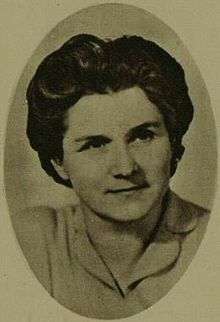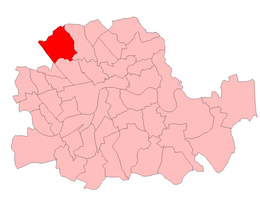Renee Soskin
Renee Rachel Soskin JP (née Beloff) (December 1916 – 1998), was a British teacher, company director and Liberal Party politician.

Background
She was born Renee Rachel Beloff, daughter of merchant Semion (Simon) Beloff (born Semion Rubinowicz) and his wife Maria (Marie) Katzin, who were Russian Jews who had moved to England in 1903.[1] She was one of five children. She was a younger sister to Max Beloff the historian and member of the House of Lords. She was older sister to John Beloff the psychologist. Her sister Anne later married German-born Nobel Prize–winning biochemist Ernst Boris Chain in 1948. She was educated at King Alfred School, London, and the Royal Academy of Music[2] and trained for the stage.[3] She married Moses G. Soskin.
Professional career
She was a speech and drama teacher. She was a teacher of drama at the Royal Academy of Music.[4] She was managing director of a City of London finance house.[5] She became a Company Director of two companies.[6] In 1970 she became the new proprietor of Bury Lawn Independent Day School a coeducational independent school in Milton Keynes. The school, now called the Webber independent school, is located in Soskin Drive, which was named after her.
Political career
She was a County of London Magistrate.[7] She was Chairman of the Hampstead Liberal Association for four years.[8] In 1958 she was first elected a Member of the Liberal Party Council.[9] She was Liberal candidate for the Bedfordshire South division at the 1959 General Election. During the 1959 General election campaign she featured in a televised Liberal Party Election Broadcast.[10] This additional exposure was not enough to help her win and she finished third.[11] In 1961 she was elected Vice-President of the Women's Liberal Federation, serving until 1963.[12] In 1964 she was Vice-Chairman of the Women's Liberal Federation.[13] She was Liberal candidate for the Hampstead division at the 1964 United Kingdom general election. She was Liberal candidate again for Hampstead at the 1966 General Election. On both occasions she finished third.[14]
Election results
| Party | Candidate | Votes | % | ± | |
|---|---|---|---|---|---|
| Conservative | Norman John Cole | 25,861 | 47.1 | ||
| Labour | Walter Hamlet Johnson | 21,102 | 38.5 | ||
| Liberal | Renee Rachel Soskin | 7,912 | 14.4 | ||
| Majority | 4,759 | 8.6 | |||
| Turnout | 54,875 | 83.9 | |||
| Conservative hold | Swing | ||||

| Party | Candidate | Votes | % | ± | |
|---|---|---|---|---|---|
| Conservative | Rt Hon. Henry Brooke | 19,888 | 43.3 | ||
| Labour | John W T Cooper | 18,053 | 39.3 | ||
| Liberal | Renee Rachel Soskin | 8,019 | 17.4 | ||
| Majority | 1,835 | 4.0 | |||
| Turnout | 45,960 | 67.6 | |||
| Conservative hold | Swing | ||||
| Party | Candidate | Votes | % | ± | |
|---|---|---|---|---|---|
| Labour | Benjamin Charles George Whitaker | 22,963 | 46.8 | ||
| Conservative | Rt Hon. Henry Brooke | 20,710 | 42.2 | ||
| Liberal | Renee Rachel Soskin | 5,182 | 10.7 | ||
| Socialist (GB) | Harry Baldwin | 211 | 0.4 | ||
| Majority | 2,253 | 4.6 | |||
| Turnout | 49,066 | 72.4 | |||
| Labour gain from Conservative | Swing | ||||
References
- The Times, 24 March 1999, p23
- The Times House of Commons, 1964
- The Times House of Commons, 1959
- The Times House of Commons, 1959
- The Times House of Commons, 1964
- The Times House of Commons, 1966
- The Illustrated London News 3 October 1959
- The Times House of Commons, 1959
- The Times House of Commons, 1966
- The Illustrated London News 3 October 1959
- F W S Craig, British Parliamentary Election Results 1950–1973; Political Reference Publications, Glasgow 1973
- The Times House of Commons, 1966
- The Times House of Commons, 1964
- F W S Craig, British Parliamentary Election Results 1950–1973; Political Reference Publications, Glasgow 1973
- F W S Craig, British Parliamentary Election Results 1950–1973; Political Reference Publications, Glasgow 1973
- F W S Craig, British Parliamentary Election Results 1950–1973; Political Reference Publications, Glasgow 1973
- F W S Craig, British Parliamentary Election Results 1950–1973; Political Reference Publications, Glasgow 1973